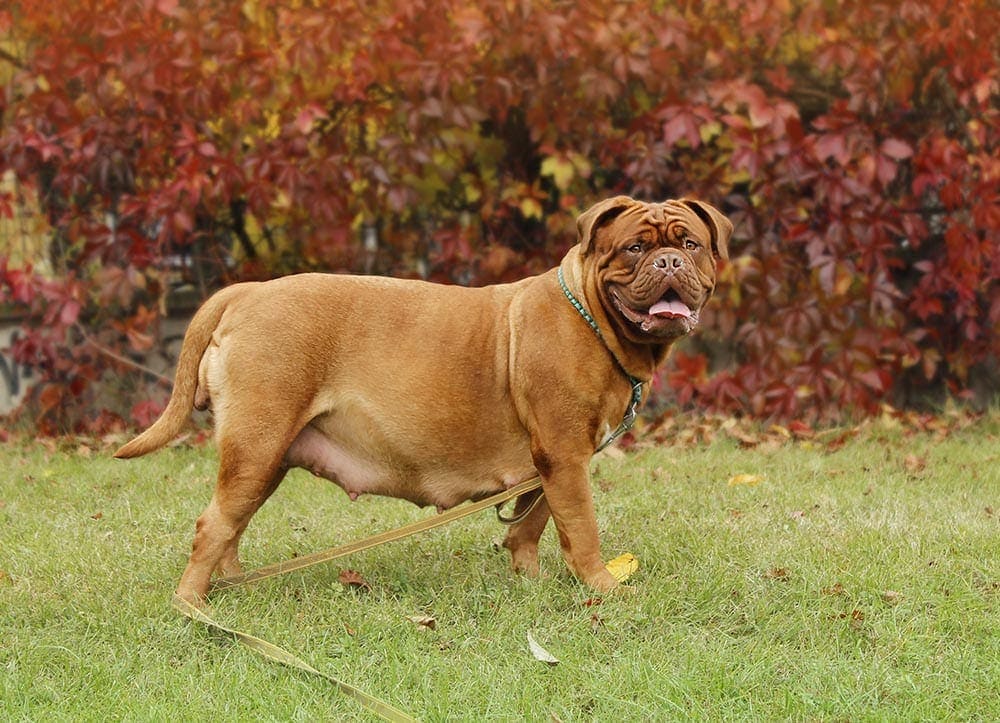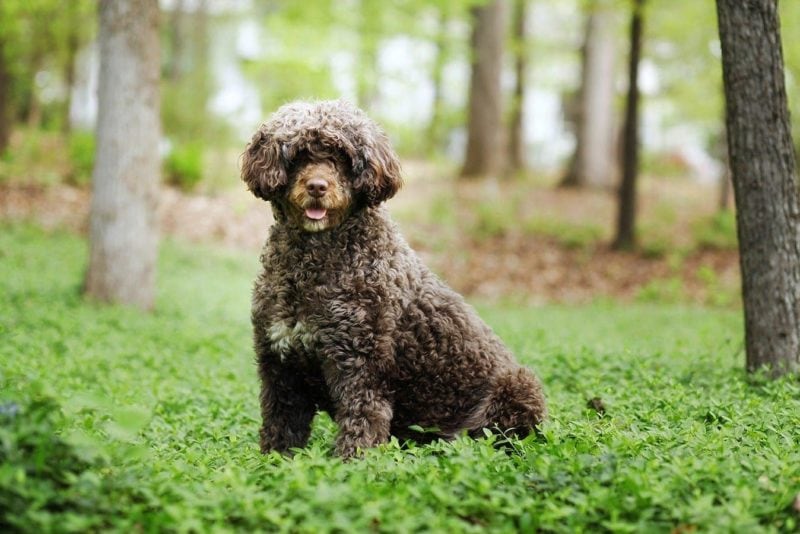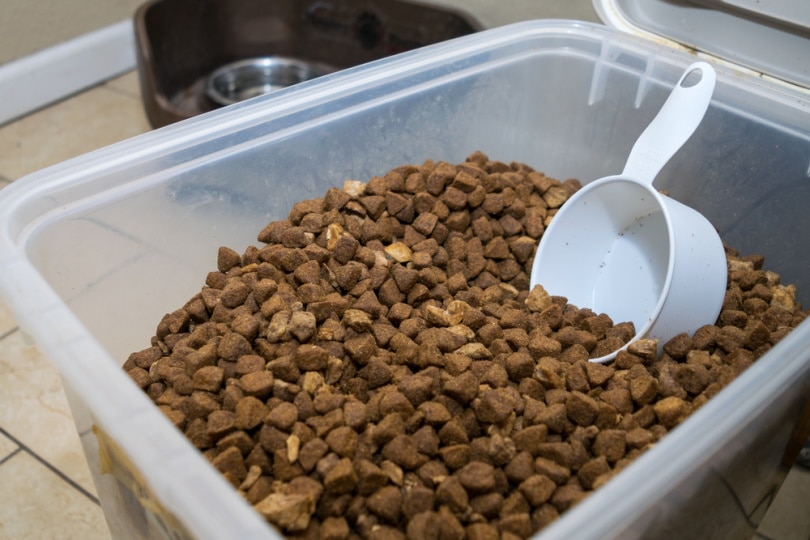How to Get Rid of Dog Anal Gland Smell: 6 Vet-Approved Tips
Updated on

Click to Skip Ahead
As a dog owner, the sight of dogs meeting new dogs by sniffing their behinds is pretty common. This is because near their anus, all dogs possess two anal sacs, also known as perianal sacs (one to the right and another to the left of the anus). The function of these sacs is to store an oily, often smelly liquid which is secreted whenever your dog defecates. This liquid is produced by your dog’s anal glands. The liquid itself is used by dogs to identify each other and to mark territory. When dogs sniff each other’s bums, they are smelling this liquid to gain cues about the other dog.
The secretion of a dog’s anal glands are very pungent and smelly. However, in some cases, dogs’ anal glands can get extremely smelly for various reasons. The general term for these reasons is known as anal sac disease. The disease itself may have several causes, such as impaction or infections. This can be painful, and in some cases may cause your dog’s behind to have a bad smell that can leave an odor on your household items and clothes.
Dealing with a dog that has foul-smelling anal glands isn’t going to be pleasant, but we have compiled several tips that you can use to get rid of the smell from both your dog and around your home.
Before You Start
Under normal circumstances, your dog’s anal sacs are expressed everytime they defecate. The muscles that control their anal sphincter will also squeeze the sacs everytime your dog chooses to relieve themselves. Therefore, if your dog’s anal glands seem to have a problem (including an exceptionally foul smell), your dog should get checked out by a veterinarian.
- Greasy fur around your dog’s anus
- Thickening of the skin around your dog’s anus
- Pain and discomfort when sitting
- Pain and discomfort while defecating, or difficulty in passing feces
- Excessively licking and biting the anus
- Scooting their bum across the floor
- A large growth or lump on one or both sides of your dog’s anus
- A yellow or green foul smelling discharge from around your dog’s anus
- Blood or any other discharge from your dog’s anus
Depending on the cause of your dog’s anal sac issues, your vet may opt for treatment options such as flushing the sacs, manually expressing the glands to relieve your dog, prescribing anti-inflammatory or antimicrobial medications, or surgery.
After you have had your dog checked out by a vet, getting rid of the smell while they are being treated is going to be easy once you have the right supplies and once the underlying cause has been addressed. Please note that some conditions involving the anal sacs (such as cancerous growths) may take a very long time to resolve.
- An enzymatic pet cleaner
- Pet cleaning wipes
- White spirit vinegar
- Baking soda
- Topical antiseptics or antibiotics (if prescribed by your veterinarian)
- Disposable medical gloves
- An old towel
- A bowl
- Water-based lubricant or petroleum jelly
- Cosmetic cotton pads
The 6 Ways to Get Rid of Dog Gland Smell
1. Seek Professional Grooming
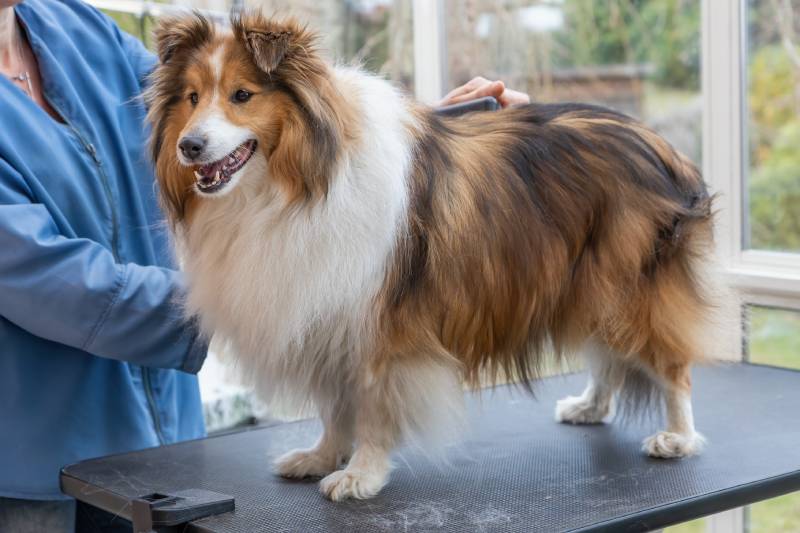
This step does not necessarily combat the smell around your house but is useful nonetheless. If your dog’s condition still allows them to be groomed near their bum (your vet will determine this for you), then a good starting point is to have a professional groomer gently clip the area around your dog’s bum. This is usually done by groomers for hygienic purposes, but is also useful for you as it allows you to easily visualize your dog’s anus to see if any issues are recurring, or how your dog is healing.
In many instances, your veterinarian will likely do this before inspecting your dog’s anus and anal sacs, however, certain circumstances might warrant them asking you to groom your dog later (for example, if the infection is too severe when your dog is first presented, your vet may ask you to wait a while before grooming your pup). A good bath during a grooming session can also remove traces of the anal sac secretions from around the fur of your dog’s anus, reducing the odor from the area.
2. Pet-Safe Wipes
The smelly fluid that oozes out of the glands is the reason for the smell that is left on anything your dog sits on. Using pet-safe wipes can help remove some of the liquid and mask the smell. Ideally, you should be using deodorizing pet wipes that are created for dogs.
These types of wipes can safely be used to deodorize the smell from your dog’s anal glands without causing any irritation to the area. Pet-safe wipes will come in handy when you are trying to keep the oozing fluid at a minimum in between your dogs’ baths.
High-quality wet wipes can help you keep your dog clean from head to tail. Our Hepper Wash Wipes are infused with natural, moisturizing ingredients that will soothe your dog's skin while effectively removing dirt and grime. These soft, hypoallergenic wipes are made in the USA and safe for dogs and puppies of all breeds.
- Gentle Care For All Pets - Infused with moisturizing hypoallergenic ingredients & enriched with...
- Deep Cleans From Head to Tail - Tackle the toughest dirt & messes with our extra strong pet wipes...
3. Enzymatic Pet Cleaner
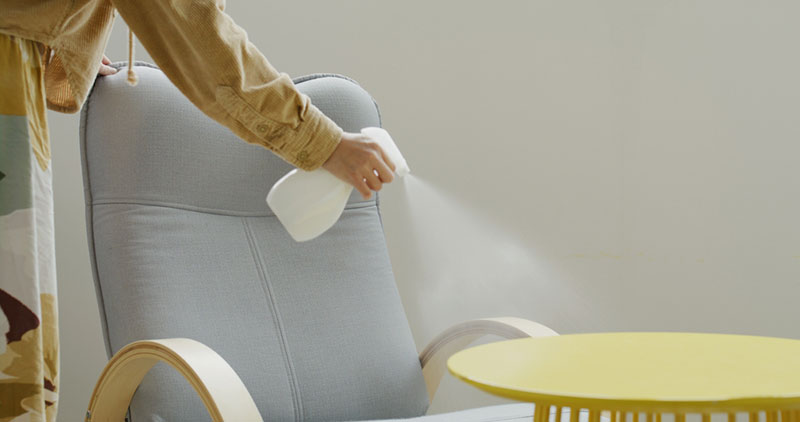
If your dog’s anal gland fluid has made its way onto your furniture or flooring, using an enzymatic cleaner is going to be the best way to keep the odor to a minimum. These types of cleaners don’t just mask the smell with strong perfumes but break down the odor molecules responsible for the smell by releasing enzymes.
There are a variety of enzymatic pet cleaners to choose from, and they are great to keep around to neutralize and break down pet urine and gland smells. However, you shouldn’t use these types of cleaners directly on your dog’s butt. The ingredients and strength of these cleaners can cause irritation and a burning sensation for dogs with anal gland infections.
Our favorite enzyme cleaner is the Hepper Advanced Bio-Enzyme Pet Stain & Odor Eliminator Spray. It's our product, and we love it so much, we just have to share. It permanently removes the very worst smells and stains (yes, everything you can imagine!), and we offer a 100% satisfaction guarantee!
- ADVANCED ENZYMATIC CLEANER - Penetrates the most stubborn smells and stains at the deepest molecular...
- FOR ANY MESS, ON ANY SURFACE - This pet odor eliminator cleans your carpets, floors, furniture,...
4. Topical Antiseptic or Antibiotics (Vet Prescribed)
Since a possible infection is a common cause for many dogs with anal gland problems, a vet-prescribed antiseptic or antibiotic can fight the infection and fix the smell. A vet may also give your dog anti-inflammatory medications if the anal gland infection is causing your dog swelling and pain. Depending on the severity of the infection, some dogs may need their anal glands manually expressed or flushed by a veterinarian before medication is prescribed.
Once the anal glands are drained and the infection is taken care of, the fishy smell will usually stop. Please note that this is only advised, if, as mentioned above, the medication is prescribed to you. Certain anal gland conditions do not warrant the use of these medications. You shouldn’t ever try to self-medicate or self-diagnose your pet, as doing so many makes the condition worse.
5. Baking Soda
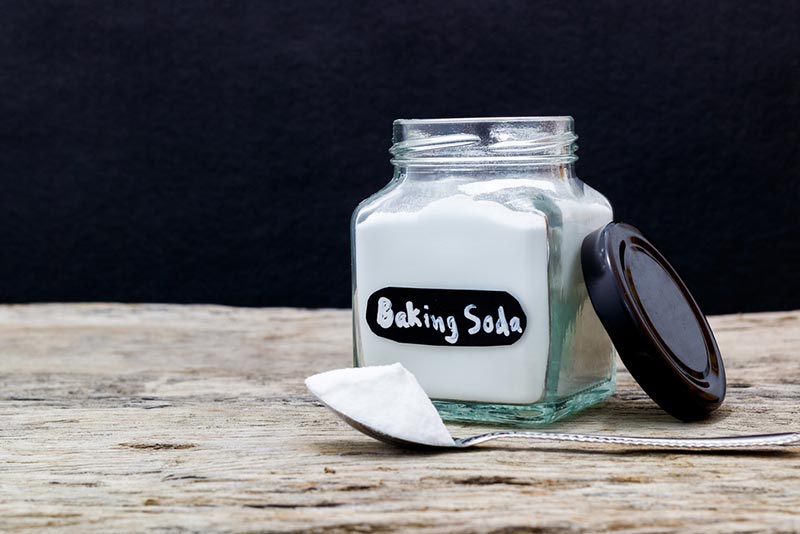
If you have furniture that shouldn’t get wet or is too delicate to handle cleaning products, sprinkling baking soda over the smelly area helps to combat gland smells. Baking soda is a natural and safe way to neutralize the odor-causing acids and it’s easy to clean up afterwards with a simple vacuum or scoop. Plus, you can use a solution of baking soda and water in your dog’s bath to neutralize odors, without it being harmful unless it’s consumed in large amounts. When bathing your dog this way, do not apply the carbonated water onto their head, face, or near their eyes.
You can also apply a solution of baking soda and lukewarm water to a cotton pad to neutralize the odors on your dogs’ glands, although this is less effective than deodorizing pet wipes. For such a solution, 1 part baking soda to 4 parts of water is recommended. However, you should seek permission from your veterinarian before using this on your dog’s butt, as applying water carbonated with baking soda onto your dog’s skin may increase the blood flow to the area. This might prove counterproductive for some ailments (such as an unwanted growth in the area).
6. Manually Expressing the Anal Glands
While many people prefer their dogs’ anal glands to be expressed manually by a veterinarian or pet groomer, you might be able to take on this messy (and smelly!) part yourself. You will want to keep your dog occupied by letting them chew a toy or use a lick mat. Place an old towel that you can dispose of to clean up any mess.
Using disposable medical gloves is going to keep your hands clean and protected. It is best to wear two layers of gloves on each hand. Once your dog is occupied, you can begin expressing their anal glands by lubricating the area with water-based lubricant or petroleum jelly and gently squeezing the anal glands together. The glands will be located on either side of your dog’s butt and feel like puffy peas or grapes. They should be no larger than a kidney bean (in a very large breed of dog).
Hold a bowl or towel underneath to catch the oozing liquid. Once you have squeezed out the fluid, wipe the area with a wipe or bathe your dog. If you notice that the fluid is green, yellow, or chunky, your dog should be checked out by a veterinarian because it could indicate an infection.
7. White Spirit Vinegar

If you prefer going the natural or inexpensive route when combatting gland smells, white spirit vinegar is a great odor neutralizer. White spirit vinegar should be diluted in water in your preferred strength depending on the item being cleaned. You can use white spirit vinegar to wash your dog’s bedding, floors, countertops, or linen to neutralize the unpleasant odors.
You can also mix white spirit vinegar with baking soda and water to form a more powerful yet natural cleaning solution but don’t use this directly on your dog’s butt because it is too harsh.
8. Lemon and Vinegar
A very effective yet simple to make cleaning solution for your furniture and floors is a lemon and vinegar solution. This can be made by mixing ½ cup of lemon juice with 2 cups of white vinegar in a bottle. The solution should help remove the greasy stains of anal sac secretions from your floor and furniture. The lemon juice also helps deodorize some surfaces. However, the solution might not be gentle on fabrics, such as a couch, and should be spot tested at an inconspicuous area before using it elsewhere. In addition, you shouldn’t spray this solution onto your dog, and you shouldn’t let your dog lick this solution either.
Conclusion
The fluid that leaks out of your dogs’ anal glands is the main source of the sour and fishy smell that can overwhelm many dog owners. A veterinarian will help address and treat the underlying problem that could be causing problems with your dogs’ anal glands.
Manually expressing the anal glands can help relieve any discomfort or minor problems your dog is having with their glands, but infected or impacted anal glands will need to be treated with vet-prescribed medications. To get rid of the foul anal gland fluid around your house, enzymatic cleaners along with baking soda and white spirit vinegar will help neutralize and control the odor.
Featured Image Credit: UfaBizPhoto, Shutterstock





